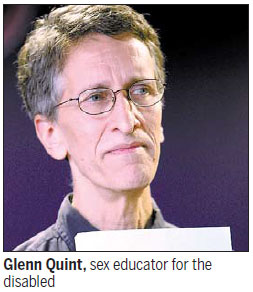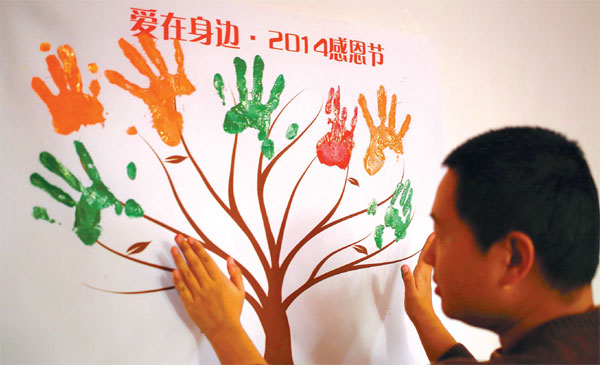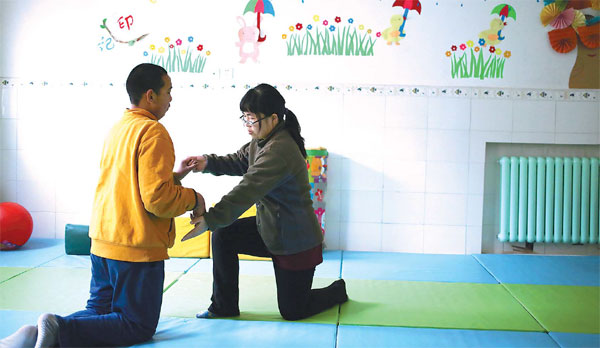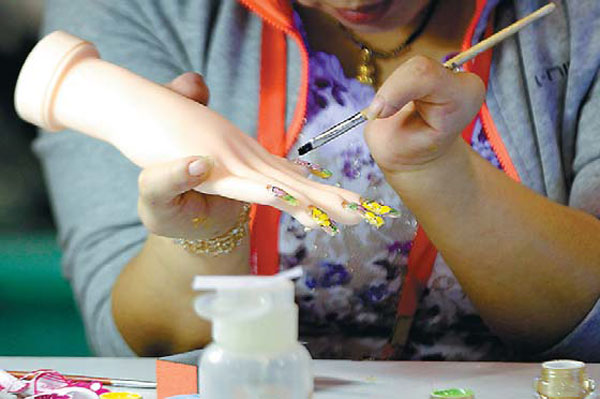Learning how to flirt
Updated: 2015-01-16 07:10
By Yang Wanli(China Daily Europe)
|
|||||||||||
Through the pioneering work of sex educator Glenn Quint, NGOs and institutes in China are helping disabled youths manage their sexuality
Hu Minting, 28, who works at Nurturing Relationships, a nongovernmental organization in South China's Guangdong province that educates youth with disabilities, remembers the first time she worked alongside Glenn Quint, a pioneer in sex education for the disabled.
It was in 2009, a year after Quint had been invited by the Special Education Center of Guangzhou Youth Palace, the Guangzhou Yangai Special Children's Parents Club, and the Guangzhou Qizhi School of Special Education to provide consultation on the issues surrounding disability and sexuality.
|
A physically disabled person decorates the wall at the Disabled Persons' Rehabilitation Center in Beijing. Wang Jing / China Daily |
"Several parents of disabled children asked for help from teachers in these special education schools and organizations, saying that they couldn't handle the awkwardness of adolescence that their children had displayed," says Hu, who at the time was an intern at the Guangzhou Yangai Special Children's Parents Club.
While Hu recalls Quint as a wildly creative and personable teacher, what truly surprised her was his honesty and tolerance of sex education and his systematic research on how sex is taught in the United States and Europe.
"When he talked about sexual desire and youths' curiosity toward sexuality, his eyes never spoke of shame, as many people do in China," she says.
Quint, 61, taught Germany's first human sexuality class in 1983 as a second-grade teacher in Berlin. In the 1990s and from 2007-2009, he worked for Planned Parenthood as an outreach educator, speaking to thousands of parents, children and teenagers about human sexuality. He then worked for 19 months in Guangzhou as a sex education consultant, focusing on sexuality and disability. He is the author of We are Growing Up: Sexuality Education Lesson Plans for Children with Disabilities, China's first human sexuality curriculum for people with developmental and physical disabilities.
He also created the first sexuality website in China to provide a comprehensive approach to human sexuality for youth and adults.
"China had no such expert on sexuality and disability and we did need help," Hu recalls. "We were dealing with boys who were fond of women's silk stockings and even tried to touch women who were wearing stockings in public. Girls had difficulties taking care of themselves during their menstruation."

Discussions of sex have been taboo in China for thousands of years. Even today, sex education is not widely promoted in schools across the country. Almost all teachers currently working in special educations schools graduated from Chinese universities that did not have courses on sex education. Most learned what they know about sex and disabilities through seminars or workshops organized by NGOs and foreign research institutes.
But in 2009, with Quint's assistance, an education program was established to train teachers, professionals, and parents about sex education for the disabled. The program worked directly with children, teenagers, and adults with physical and developmental disabilities, such as autism.
Classes were hosted by the trio of aforementioned organizations and by Nurturing Relationships, and involved about 2,700 people, including teachers from special education schools and NGOs supporting the education of the disabled.
In just 19 months, Quint trained Hu and 24 other professionals to be the first group of sex education consultants in the province.
Quint says there was an immediate need to provide sex education to youths in China to not only tackle the embarrassing incidents in their lives but to prevent them from being ashamed of who they are or from being hurt.
In the US, he says more than 90 percent of people with developmental disabilities will be sexually abused at some point in their lives, 49 percent of whom will suffer from 10 or more abusive incidents.
"I don't know what the statistics are for China, but I doubt they're any better. I came to help, to teach them to say 'no' to unwanted touches," Quint says.
According to the China Disabled Persons' Federation, by the end of 2010, there were more than 85 million people with disabilities in the country, 20 percent of whom have mental and emotional disabilities, while more than 25 percent have physical disabilities. Most have hearing or speech impairments, or multiple disabilities.
The Ministry of Education says the government has in recent years been making greater efforts to provide more educational opportunities for the disabled, claiming that by December 2012, nearly 72 percent of disabled children had access to compulsory education, a 10 percent rise from 2008. The bump in numbers was attributed to the establishment of special training schools and centers in China.
But little progress has been made with regard to sexuality and disability, especially among people with mental or emotional impairments, or those whose problems result in diminished intellectual abilities.
"Many people believe that disabled people have no sexual desires, or believe that their sex lives will almost certainly result in trouble, such as unplanned pregnancies," said Cai Cong, a visually impaired man who works for One Plus One, a disabled culture development center in Beijing.
Cai says parents will resort to desperate measures to avoid unplanned pregnancies, such as authorizing doctors to remove their daughter's uterus, a practice supported by special education schools.
"When we discuss their (disabled people's) rights to have sex, get married, or even have children, the most common question people ask is: Isn't it enough for a family to have one abnormal child?" Cai explains.
'This is normal'
Despite her four years as a teacher at Lizhi Disabled Persons Rehabilitation Center, Xu Yulu was still embarrassed when she discovered a male student masturbating in a dormitory.
"It happens a lot and usually there's more than one student involved, but I know this is normal in the physical development of disabled people," the 28-year-old says.
The center, located in an old kindergarten building in the Fengtai district of Beijing, started providing services to emotionally and mentally impaired people from the ages of 15 and older in 2008. There are currently 81 students, and in addition to teaching basic life and communication skills, the center also provides students with opportunities to take part-time jobs.
Students who need to live at the center from Monday to Friday are charged about 3,500 yuan per month.
"We have often noticed intimate acts between male and female students, such as holding hands, touching each other's bodies, or kissing. Sometimes this also happens between students of the same gender," said Yang Chao, deputy director of the center.
"People who are emotionally and mentally impaired know sadness, happiness and shame. They are physically healthy and have sexual impulses. The key is how to teach them to express their sexuality in appropriate ways, rather than depriving them of the right to express or enjoy it."
China has no official programs to promote sex education for the disabled - most of the work is done by a handful of NGOs. In August 2013, the country's first workshop on disability, gender and sexuality was held at the privately organized 5th Asian Conference on Sexuality Education in Chengdu, capital of Sichuan province.
"Everyone needs ongoing and age-appropriate sex education to help them develop positive attitudes about their sexuality, and that includes people with disabilities," said Alessandra Aresu, director of Handicap International China, an NGO that supports disabled and vulnerable people.
She said providing sex education for intellectually impaired people younger than 18 can help them to stay safe, prevent them from contracting sexually transmitted diseases and stop unplanned pregnancies.
In Quint's eyes, youths with disabilities need to learn more about the skills they'll need to become sexually healthy adults. To this end, one of the things he taught some older students in Guangdong was how to flirt.
"We discussed the different ways to flirt when you're interested in someone, including smiling, giggling, laughing, complimenting, making eye contact, finding out the other person's interests, or touching the other person on the arm or hand. Then we had the students practice their techniques on life-size male and female outlines that we had drawn on the blackboard," he said.
Quint has also worked with parents of children who have disabilities.
"What had these parents accomplished? In a society where most people didn't see the connections between disability and healthy sexuality, these parents were doing the impossible," he says.
Apart from promoting sex education, NGOs are also educating the public about the rights of disabled people to express their sexual needs in appropriate ways and supporting their right to marriage and reproduction.
Du Jingchen, program assistant at the Enable Disability Studies Institute in Beijing, which focuses on social work and legal support for people with disabilities, says: "Before we let them know 'how', we should help them and the public to realize that people with disabilities are equal to everyone else, and they have the right to make their own choices under professional guidance."
In some cases, protecting disabled children from sexual abuse can be problematic for parents. Last year, a couple visited the institute because their 15-year-old daughter, who is severely mentally impaired, was being sexually abused at school.
The couple warned other parents that their children could have been abused.
"Of the three girls examined, one was found to have had her hymen ruptured within the past seven days," Du said. "However, none of the parents chose to call the police because the city has so few special education schools with good facilities, and they were worried about where they would send their daughters if the school was prosecuted."
Since July, the institute has cooperated with the Ford Foundation, a private organization in New York that works to advance human welfare, to train 20 teachers in the protection of disabled people's sexual rights. The project will draw upon experiences of disabled people in Taiwan, the US and a number of European countries.
"It's a start for disabled children and their parents. Of course, 20 is small number, but those few teachers will bring a very, very big future with them," Du says.
Zhao Xu contributed to this story.
yangwanli@chinadaily.com.cn
|
Xu Yulu, a teacher at the Disabled Persons' Rehabilitation Center in Beijing, interacts with a mentally disabled man. China is working with NGOs to educate disabled youngsters and their parents to provide a better understanding of the relationship between sexuality and their physical and mental conditions. Wang Jing / China Daily |
|
A physically disabled person uses a brush to do a manicure on a model hand during a competition for people with disabilities in Nanjing. Dong Jinlin / China Daily |
(China Daily European Weekly 01/16/2015 page24)
Today's Top News
Italian president resigns
British hospital says has suspected Ebola case
Putin not to attend Auschwitz events
Turkey to help in foiling suspects from Xinjiang
Black Box of crashed AirAsia jet retrieved
Arson attack at paper that ran Charlie Hebdo cartoons
Improved screening to secure safe blood transfusion
Ambitious course set for global airliner market
Hot Topics
Lunar probe , China growth forecasts, Emission rules get tougher, China seen through 'colored lens', International board,
Editor's Picks

|

|

|

|

|

|








